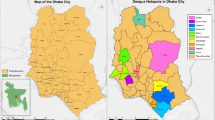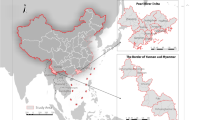Abstract
Dengue is one of the world’s most rapidly spreading mosquito-borne viral diseases. As it is found mostly in urban and semi-urban areas, urbanization and associated human activities that affect the environment and larval habitats could become risk factors (e.g., lane width, conditions of street ditches) for the spread of dengue. However, there are currently no systematic studies of micro-scale urbanization-based risk factors for the spread of dengue epidemics. We describe the study area, two micro-scale environmental risk factors associated with urbanization, and meteorological data. Since the observations involve spatial and temporal correlations, we also use some statistical methods for the analysis of spatial and spatial-temporal data for the relationship between urbanization and dengue. In this study, we analyzed data from Kaohsiung, a densely populated city in southern Taiwan, and found a positive correlation between environmental risk factors associated with urbanization (ditches positive for mosquito larvae and closely packed streets termed “dengue lanes”) and clustering effects in dengue cases. The statistical analysis also revealed that the occurrence of positive ditches was significantly associated with that of dengue lanes in the study area. The relationship between climate variables and positive ditches was also analyzed in this paper, indicating a relationship between dengue and both rainfall and temperature, with temperature having a greater effect. Overall, this work is immediately relevant and applicable for policymakers in government, who will need to reduce these favorable habitats for vector-born disease spreaders and implement regulations for new urban constructions to thus reduce dengue spread in future outbreaks.




Similar content being viewed by others
Data availability
The data set is available if the applicant gets granted by the Kaohsiung City government.
References
Akhtar R, Gupta PT, Srivastava AK (2016) Urbanization, urban heat island effects and dengue outbreak in Delhi. In: Akhtar R (ed) Climate change and human health scenario in South and Southeast Asia. Advances in Asian Human-Environmental Research. Springer, Cham, pp 99–111
Bhatt S, Gething PW, Brady OJ, Messina JP, Farlow AW, Moyes CL, Drake JM, Brownstein JS, Hoen AG, Sankoh O, Myers MF, George DB, Jaenisch T, Wint GR, Simmons CP, Scott TW, Farrar JJ, Hay SI (2013) The global distribution and burden of dengue. Nature 496:504–507. https://doi.org/10.1038/nature12060
Chen Y, Ong JHY, Rajarethinam J, Yap G, Ng LC, Cook AR (2018) Neighbourhood level real-time forecasting of dengue cases in tropical urban Singapore. BMC Med 16:129. https://doi.org/10.1186/s12916-018-1108-5
Gubler DJ (2011) Dengue, urbanization and globalization: the unholy trinity of the 21(st) century. Trop Med Health 39:3–11. https://doi.org/10.2149/tmh.2011-S05
Hales S, de Wet N, Maindonald J, Woodward A (2002) Potential effect of population and climate changes on global distribution of dengue fever: an empirical model. Lancet 360:830–834. https://doi.org/10.1016/S0140-6736(02)09964-6
Kendall C, Hudelson P, Leontsini E, Winch P, Lloyd L, Cruz F (1991) Urbanization, dengue, and the health transition: anthropological contributions to international health. Med Anthropol Q 5:257–268
Kolimenakis A, Heinz S, Wilson ML, Winkler V, Yakob L, Michaelakis A, Papachristos D, Richardson C, Horstick O (2021) The role of urbanisation in the spread of Aedes mosquitoes and the diseases they transmit – a systematic review. PLoS Negl Trop Dis 15:e0009631. https://doi.org/10.1371/journal.pntd.0009631
Lee JM, Wasserman RJ, Gan JY, Wilson RF, Rahman S, Yek SH (2020) Human activities attract harmful mosquitoes in a tropical urban landscape. EcoHealth 17:52–63. https://doi.org/10.1007/s10393-019-01457-9
Li Q, Cao W, Ren H, Ji Z, Jiang H (2018) Spatiotemporal responses of dengue fever transmission to the road network in an urban area. Acta Trop 183:8–13. https://doi.org/10.1016/j.actatropica.2018.03.026
Liang KY, Zeger SL (1986) Longitudinal data analysis using generalized linear models. Biometrika 73:13–22
Lin PS (2008) Estimating equations for spatially correlated data in multi-dimensional space. Biometrika 95:847–858
Lowe R, Lee SA, O’Reilly KM, Brady OJ, Bastos L, Carrasco-Escobar G, de Castro CR, Colón-González FJ, Barcellos C, Carvalho MS, Blangiardo M, Rue H, Gasparrini A (2021) Combined effects of hydrometeorological hazards and urbanisation on dengue risk in Brazil: a spatiotemporal modeling study. Lancet Planet Health 5:e209–e219. https://doi.org/10.1016/S2542-5196(20)30292-8
Moran PAP (1950) Notes on continuous stochastic phenomena. Biometrika 37:17–23
Pan CY, Liu WL, Su MP, Chang TP, Ho HP, Shu PY, Huang JJ, Lin LJ, Chen CH (2020) Epidemiological analysis of the Kaohsiung city strategy for dengue fever quarantine and epidemic prevention. BMC Infect Dis 20:347. https://doi.org/10.1186/s12879-020-4942-y
Phanitchat T, Zhao B, Haque U, Pientong C, Ekalaksananan T, Aromseree S, Thaewnongiew K, Fustec B, Bangs MJ, Alexander N, Overgaard HJ (2019) Spatial and temporal patterns of dengue incidence in northeastern Thailand 2006-2016. BMC Infect Dis 19:743. https://doi.org/10.1186/s12879-019-4379-3
Sarma DK, Kumar M, Balabaskaran Nina P, Balasubramani K, Pramanik M, Kutum R, Shubham S, Das D, Kumawat M, Verma V, Dhurve J, George SL, Balasundreshwaran A, Prakash A, Tiwari RR (2022) An assessment of remotely sensed environmental variables on dengue epidemiology in Central India. PLoS Negl Trop Dis 16:e0010859. https://doi.org/10.1371/journal.pntd.0010859
Seidahmed OME, Lu D, Chong CS, Ng LC, Eltahir EAB (2018) Patterns of urban housing shape dengue distribution in Singapore at neighborhood and country scales. GeoHealth 2:54–67. https://doi.org/10.1002/2017GH000080
Troyo A, Fuller DO, Calderón-Arguedas O, Solano ME, Beier JC (2009) Urban structure and dengue incidence in Puntarenas, Costa Rica. Singap J Trop Geogr 30:265–282. https://doi.org/10.1111/j.1467-9493.2009.00367.x
Tsheten T, Clements ACA, Gray DJ, Wangdi K (2021) Dengue risk assessment using multicriteria decision analysis: a case study of Bhutan. PLoS Negl Trop Dis 15:e0009021. https://doi.org/10.1371/journal.pntd.0009021
Wilke ABB, Vasquez C, Carvajal A, Moreno M, Fuller DO, Cardenas G, Petrie WD, Beier JC (2021) Urbanization favors the proliferation of Aedes aegypti and Culex quinquefasciatus in urban areas of Miami-Dade County, Florida. Sci Rep 11:22989. https://doi.org/10.1038/s41598-021-02061-0
World Health Organization (2022) Dengue and severe dengue. World Health Organization. https://www.who.int/news-room/fact-sheets/detail/dengue-and-severe-dengue
Wu PC, Lay JG, Guo HR, Lin CY, Lung SC, Su HJ (2009) Higher temperature and urbanization affect the spatial patterns of dengue fever transmission in subtropical Taiwan. Sci Total Environ 407:2224–2233. https://doi.org/10.1016/j.scitotenv.2008.11.034
Yuan HY, Wen TH, Kung YH, Tsou HH, Chen CH, Chen LW, Lin PS (2019) Prediction of annual dengue incidence by hydro-climatic extremes for southern Taiwan. Int J Biometeorol 63:259–268. https://doi.org/10.1007/s00484-018-01659-w
Author information
Authors and Affiliations
Corresponding authors
Rights and permissions
Springer Nature or its licensor (e.g. a society or other partner) holds exclusive rights to this article under a publishing agreement with the author(s) or other rightsholder(s); author self-archiving of the accepted manuscript version of this article is solely governed by the terms of such publishing agreement and applicable law.
About this article
Cite this article
Lin, PS., Liu, WL., Chen, CD. et al. Micro-scale urbanization-based risk factors for dengue epidemics. Int J Biometeorol 68, 133–141 (2024). https://doi.org/10.1007/s00484-023-02577-2
Received:
Revised:
Accepted:
Published:
Issue Date:
DOI: https://doi.org/10.1007/s00484-023-02577-2




